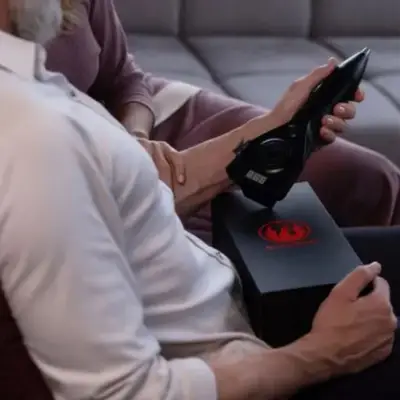Treating pain in children and babies is very much unlike treating pain in adults. That’s because there are obvious limitations when it comes to prescription and over-the-counter medications that you can give to children. You don’t want to do more harm than good.
When used at lower levels, TENS units appear to be safe when used on babies. Yet, there isn’t much proof that a TENS unit can relieve pain in infants. But, TENS units can be used by a mother during pregnancy to alleviate labor pain and backaches common in pregnancy. This won’t harm your baby.
When it comes to medical interventions and your own children, you want to make sure that you’re making an educated decision. So, let’s go over everything you need to know about your TENS unit and babies.
Using a TENS Unit With Children
When your children are experiencing pain, your first instinct as a parent is to take the steps to fix it immediately. At the same time, you don’t want to put your children through invasive surgeries, steroid injections, or heavy-duty pain medications.
In most instances, these aren’t even options.
Before using your TENS unit on your children (or your infant), you need to get clearance from your pediatrician first. After all, there are some situations and conditions where a TENS unit could cause more harm than good.
Also, be prepared to combine the use of a TENS unit with your child’s current pain medication. Long-term use might reduce the need for medication, but you should never entirely replace your child’s medication with TENS unit treatments on a whim.
TENS Units & Newborns
Most of the studies that have been conducted using TENS units on children involved newborns.
Here’s what those studies found.
In a 2013 study, researchers were looking to determine whether a TENS unit could be used to relieve pain during normal infant medical procedures. In the case of this particular study, scientists focused on pain relief during heel sticks.
The good news is that there were no negative side effects experienced by the children in the study. The infants in the study didn’t experience changes in their vital signs before, during, or after the study was concluded.
This study helped to prove that a TENS unit used at a low-setting wasn’t dangerous to babies.
In a 2016 study, a very similar premise was tested. Researchers tested different intensities of using a TENS unit during heel sticks on newborns.
The conclusion of this study revealed that the TENS unit is safe on children, but doesn’t do all that much in the way of reducing pain.
Putting It All Together
To answer the question directly, a TENS unit is generally safe for use on babies.
But, there are a lot of things to keep in mind.
For example, there’s no guarantee that a TENS unit will actually relieve pain or discomfort in your child specifically. That means you shouldn’t expect your TENS unit to be a “cure” for your child’s health condition.
While a TENS unit is safe, there doesn’t appear to be any solid evidence that it can help to relieve pain in children. It might be worth a try once you get approval from your child’s doctor, but it might do absolutely nothing.
Most importantly, you need to place a lot of emphasis on the settings you’re using on the TENS machine as your baby uses it. Though you really want your baby to be pain-free, babies might be unable to handle high intensities.
TENS Units & Pregnant Women
When it comes to using a TENS unit on babies, you also need to consider how this type of treatment can impact unborn children still in the womb. In fact, there’s a huge potential that using a TENS unit during labor or pregnancy can greatly reduce the pain and aches associated.
A TENS unit can be extremely effective at reducing lower back and pelvic girdle pain. Just remember that a TENS unit can help to relieve pain during labor and pregnancy, but it probably won’t eliminate it entirely.
There’s a very good chance that you’ll still need to take small amounts of pain medication or undergo other treatment methods to maximize the results of your TENS unit.
Let’s go over everything there is to know about using a TENS unit when pregnant.
Using the TENS Unit Safely
The most important thing to know is how to set it up.
Whether you’re using your TENS unit during the first few trimesters or during labor, careful placement of the electrodes is perhaps most important. These should be placed on the lower back for sessions lasting between 30 and 60 minutes.
These practices are generally seen as safe for both mother and child. But, there are some limitations.
As a mother, you shouldn’t be using a TENS unit during pregnancy if you’ve been diagnosed with epilepsy, have a pacemaker, or have had a previous abortion or miscarriage. You should also avoid placing the electrodes directly on the abdominal region when pregnant.
Poor placement of the electrodes could actually cause contractions. While this might be something you want to occur closer to your due date, this is highly concerning when it happens in your first or second trimester.
Also, keep in mind that previous experience with a TENS unit during your pregnancy is recommended. You wouldn’t want to use a TENS unit for the first time while you’re in the process of giving birth.
Benefits to the Mother
The good news is that using a TENS unit during pregnancy has loads of benefits. For example, it’s known to improve wakefulness and focus while reducing the need for pain medication when in labor.
Another positive is the fact that TENS units are incredibly easy to adjust. All you have to do is adjust the intensity of the vibrations with the help of a handheld control system. Adjusting your pain relief is not something you can do with other methods.
Here’s what recent studies have discovered.
In a 2012 study, researchers focused on how using a TENS unit when pregnant could impact or improve lower back pain. These results would then be compared to the effectiveness of exercise and/or acetaminophen. The study produced remarkable results.
All study participants in both the TENS unit and the exercise groups experienced relief in their lower back pain. Compared to just 57% effectiveness in the acetaminophen group, these results are significant. All in all, the TENS unit was deemed useful.
In a 2015 review study, a team of researchers worked on reviewing previous studies that focused on using a TENS unit during active labor, specifically. Nearly 1,500 women were evaluated in total.
By the end of the study, scientists realized that there wasn’t much of a difference between the effects of a TENS unit and other pain relief methods. It didn’t reduce the need for other pain-relieving methods like an epidural.
But, it did prove to be safe for both mother and child.
Conclusion
A TENS unit is definitely safe for babies or infants in most cases. However, you’ll want to get approval from your child’s doctor first before attempting to use a TENS unit on your baby. Pain relief is important, but safety always comes first.
Though a TENS unit is seen as safe, there isn’t a guarantee that it’ll produce the results that you’re looking for.
As it turns out, many studies have determined that a TENS unit doesn’t always help with pain relief in babies. But, it won’t cause negative effects in most circumstances.
Sources
- TENS Machine Company: Hospital guidelines on TENS treatment for children
- Babycare Tens
- Evidence Based Birth: Transcutaneous Electrical Nerve Stimulation (TENS) for pain relief during labor
- Oxford Health: TENS in pregnancy
- PubMed: Transcutaneous Electrical Nerve Stimulation Improves Low Back Pain During Pregnancy
- NIH: Transcutaneous electrical nerve stimulation (TENS) for pain management in labour
- NIH: Safety of Noninvasive Electrical Stimulation of Acupuncture Points During a Routine Neonatal Heel Stick





3 responses to “Is TENS Unit Safe for a Baby?”
[…] Firstly, you can consult the manufacturer’s directions and guidelines. Secondly, you can consult with your physician. Both routes are bound to lead you in the right direction and help ensure that you’re always using your unit correctly and safely. […]
[…] units are generally safe to use, and they will provide comfort for people in pain. However, there’s research that states […]
[…] units are safe to use and don’t require the supervision of a medical professional. However, there are some […]